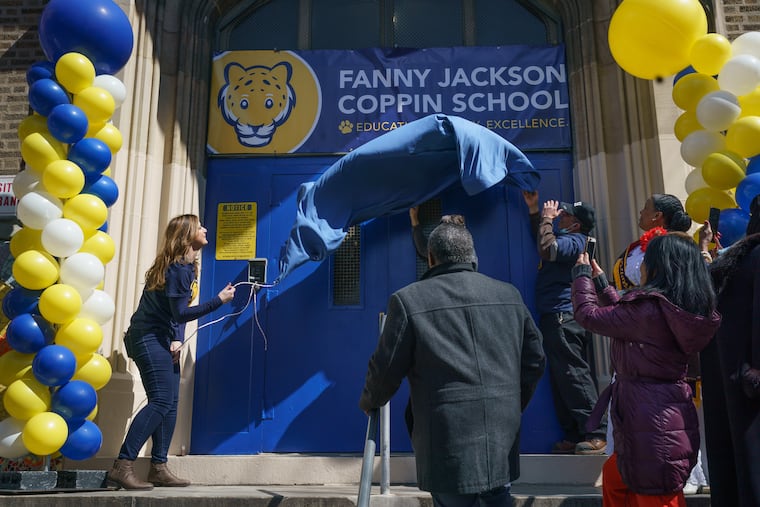This South Philly elementary has been renamed: Goodbye, Jackson. Hello, Coppin
The re-naming came with a surprise: The “Philadelphia Pathway” scholarship will guarantee free tuition to any graduate of Coppin Elementary who attends Coppin State U. in Baltimore.

Philadelphia honored trailblazing Black educator Fanny Jackson Coppin on Tuesday, formally renaming the elementary school at 12th and Federal Streets in her honor.
The South Philadelphia school, formerly known as Andrew Jackson Elementary, educates about 500 children in kindergarten through eighth grade. For several years, the community floated the idea of leaving behind the ruthless legacy of the seventh U.S. president and renaming the school — in addition to Coppin, the other namesakes considered were Acel Moore, the Pulitzer Prize-winning Inquirer journalist and mentor; abolitionist William Still; and Barbara Rose Johns, a noted civil rights advocate.
Ultimately, Coppin — who was born enslaved but rose to be head principal of the Institute for Colored Youth in Philadelphia, a precursor to Cheyney University — won the day. Students, teachers, and dignitaries crowded a closed-off 12th Street on Tuesday, cheering, clapping, and jamming to Home, Coppin’s acclaimed student rock band, all in celebration of the new name.
“Our students must be given opportunities to learn in conditions and in school buildings that reflect their values and their identities,” said Superintendent William R. Hite Jr.
The renaming came with a surprise: Anthony L. Jenkins, president of Coppin State University in Baltimore, announced the “Philadelphia Pathway” scholarship, which will guarantee free tuition to Coppin to any graduate of Coppin Elementary after high school graduation.
Education “will transform your life,” said Jenkins, himself a public school graduate and first-generation college graduate, raised by a single mother in Washington. He told the Coppin students that they were obligated to be like their school’s new namesake.
“The same tenacity that drove her is in you,” Jenkins said, adding that “money should never be the reason that you don’t earn a quality education.”
Tuition at Coppin State, a historically Black university that enrolls about 2,000, is currently $11,266 annually for non-Maryland residents.
The scholarship announcement was a surprise to Coppin principal Kelly Espinosa, who got teary at the idea of what the promise could mean to her students.
“An opportunity like that, not to be cliche, comes along once in a lifetime,” said Espinosa.
The renaming process itself was not without bumps. There were some in the community who resisted the idea of change, not because of any special ties to Andrew Jackson, but because the school has long held a place of honor in the neighborhood.
Coppin is not the only school that has cut ties with its former name, or wants to. Woodrow Wilson Middle School in the Northeast and Philip H. Sheridan Elementary in Kensington are also currently going through the name-change process, soliciting input from their communities about what they want their new names to be. Historians have put a spotlight in recent years on Wilson’s racism.
The school board must sign off on any name changes; it did so for Coppin last year.
Jackson, in the White House from 1829 until 1837, was once considered among the leading presidents, celebrated as a war hero, populist, and advocate of exploration. More recently, critics have focused on his support for slavery and his cruel policies toward Native Americans.
For years, when fourth graders learned about the school’s former namesake, a man who was responsible for forcing roughly 100,000 indigenous Americans to give up their land, they were perplexed, Espinosa said.
“They started asking us questions — ‘Why is our school named after this person?’” said Espinosa.
It was important to the naming committee to honor someone with ties to Philadelphia. And “we wanted to make sure all of our kids feel seen and feel heard. We wanted the name to represent values that reflect their values and the district’s values.”
Indeed, three Coppin fourth graders asked what they knew about Coppin and Jackson were relieved the school’s name had changed.
Coppin “was a principal and a teacher at the same time,” one student said.
Jackson owned enslaved people, another said. And “he called abolitionists monsters.”
Coppin eighth grader Brandon Lau said the school’s new name is “a change that is meaningful, and helps us to be excited to come to school.”